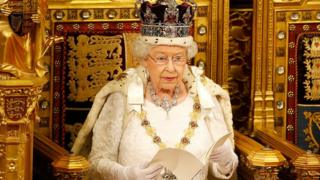Queen’s Speech: What is it and why is it important?
The vote that follows the Queen’s Speech will be a test of confidence in the government. …

 Image copyright Getty Images
Image copyright Getty Images The government has suspended Parliament to allow a Queen’s Speech to take place.
For a government to lose the vote that follows the speech would be highly unusual. But it is possible and could have serious consequences.
So, what exactly is the Queen’s Speech and what would happen if MPs rejected it?
What is the Queen’s Speech?
The Queen’s Speech provides the government with an opportunity to highlight its forthcoming priorities.
It forms part of the State Opening of Parliament ceremony, which marks the start of the parliamentary year.
The ceremony begins with a procession, where the Queen travels from Buckingham Palace to Westminster by carriage.
MPs are summoned by a House of Lords official, known as Black Rod. Before entering the Commons, Black Rod has the doors shut in their face, symbolising the chamber’s independence from the monarchy.
During the speech, the Queen sets out the laws the government wants Parliament to approve. By convention, it is announced by the monarch in the presence of MPs, peers and other dignitaries in the House of Lords.
Normally a Queen’s Speech happens once a year, but there has not been one since 21 June 2017. That’s because the previous prime minister, Theresa May, wanted a two-year parliamentary session to focus on Brexit.
Who writes the Queen’s Speech?
It is written by ministers but it is delivered by the Queen from the throne of the House of Lords.
Its length depends on the number of proposed laws and other announcements – such as foreign policy objectives – but it normally takes about 10 minutes.
Can anyone else deliver the Queen’s Speech?
The Queen has delivered the speech 64 times but was absent in 1959 and 1963, when she was pregnant.
On those occasions, the speech was read by the Lord Chancellor.
Is there a vote on it?
Yes.
A couple of hours after the speech has been given, MPs reassemble in the House of Commons to begin debating its contents.
After introductory speeches by two MPs, the prime minister will “sell” the speech to the Commons, setting out their vision for the country.
The leader of the opposition then gets their chance to respond, before other MPs are allowed to contribute.
The debate on what is known as the “Humble Address” normally lasts about five days.
At the end of the debate there is a vote. It’s normally seen as symbolic, as it is extremely rare for a government to lose it.
What happens if the government loses?
By losing a Queen’s Speech vote, MPs are effectively saying that they reject the government’s plan to bring in new laws.
Mr Johnson has already lost seven consecutive House of Commons votes since becoming prime minister. At the moment, if every non-Conservative MP voted against the government, it would lose by 43 votes.
But even though Mr Johnson would be under immense political pressure to resign if he lost the Queen’s Speech vote, he might not feel forced to do so.
If the government did lose, it wouldn’t automatically trigger an early election. However, the opposition may feel compelled to respond by proposing a motion of no confidence, leaving all MPs to vote on the matter.
Alternatively, the government could respond by calling an early election. But at least two-thirds of all MPs would have to agree to it.
When did a government last lose a Queen’s Speech?
The last time this happened was in January 1924 to Conservative Prime Minister Stanley Baldwin after he proceeded with a King’s Speech, under George V, despite having lost his majority in the previous month’s general election.
Mr Baldwin subsequently resigned and a minority Labour government took over.




